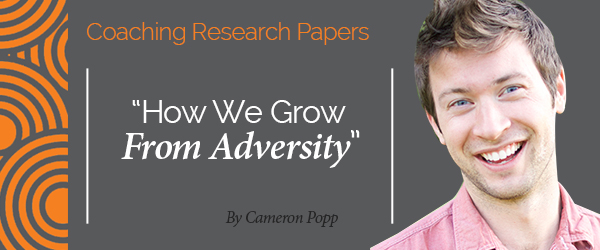Research Paper By Cameron Popp
(Life Coaching, UNITED STATES)
You seem to look upon depression as the hand of an enemy trying to crush you. Do you think you could see it instead as the hand of a friend, pressing you down to ground on which it is safe to stand? (Palmer 66).
Those words marked the pivot point in Parker J Palmer’s journey through unspeakable darkness. After struggling under the weight of depression for years, the possibility that within his suffering was opportunity provided a pinhole of light that helped guide him out of darkness and to his eventual healing. We all know on a cognitive level that what doesn’t kill us makes us stronger, but this oversimplification can prove dangerous for friends and parents, but especially for mental health practitioners and coaches. While depression is a serious issue that should not be dealt with lightly, we coaches must understand the big picture of adversity, regardless of what shape it takes. By investigating our assumptions about it, knowing how and why people grow after tragedy, and exercises to cope with it after the fact we can clarify coaching’s role in helping clients benefit and grow from adversity.
If given the chance, most people would erase any future tragedy they knew would impact themselves or those they love. Sparing your child the loss of a close friend or sparing yourself from developing debilitating food allergies makes sense because of three powerful assumptions about loss and its role in our lives. First, we assume that all loss is bad and nothing good can be gained from it.
What role do food allergies have in my future happiness? How can my child’s suffering be anything but bad?
But when you look back at moments of loss in your life, you would be hard-pressed to not find some good that came from it. Nested within disadvantage are often great advantages, as Malcolm Gladwell explores in his book David and Goliath.
Second, we assume that dancing with difficult situations will never get easier. When change comes, our negativity bias makes us focus only on what’s wrong, overpowering our natural ability to adapt and cope.
The human mind is extraordinarily sensitive to changes in conditions, but not so sensitive to absolute levels (Haidt 85).
That is to say, we are naturally very good at adapting, as long as it’s within reason. Third, we assume that tragedy should be avoided at all costs, because an ideal life is one that is free of pain and suffering. But life is full of necessary pain. From the discomfort you felt when asking your first crush on a date, to the labor your mother endured to bring you into this world, these are pains that are necessary for a fulfilling life. Eliminating them entirely is unrealistic and unhealthy. Investigating our assumptions about adversity clearly shows that life’s pains are only part of a greater, more detailed picture of human growth.
During psychology’s obsession with pathology and disease, most research focused on the damaging effects of stress and resilience—what makes people bounce back to normal after adversity. More recently, positive psychology research has focused on how people grow and flourish after the stress of a tragedy or loss. As Jonathan Haidt notes in The Happiness Hypothesis, there are three primary ways that people benefit from great stress. First, challenges show us what we are truly capable of, which strengthens our self-confidence. When Jean-Marc Hachey arrived in Ghana, West Africa as a volunteer in the early 1980’s, the country was in chaos. With hyperinflation at a peak, in the middle of a coup, and at the beginning of a decade-long drought, he had what many would consider the worst timing possible.
After two weeks of adjusting, along with eating only corn and spinach three times a day, he had no desire to leave. He quickly learned a most important lesson: the worst wasn’t that bad. Now living comfortably in Ontario, Canada, some of his fondest memories are from a time when he had next to nothing. Jean-Marc learned the most common lesson of people going through great difficulty: that he was much stronger than he realized. This experience gave him the confidence to face future challenges—if in the future he faced sudden adversity, it would not phase him, because the stress he went through would help him recover more quickly.
